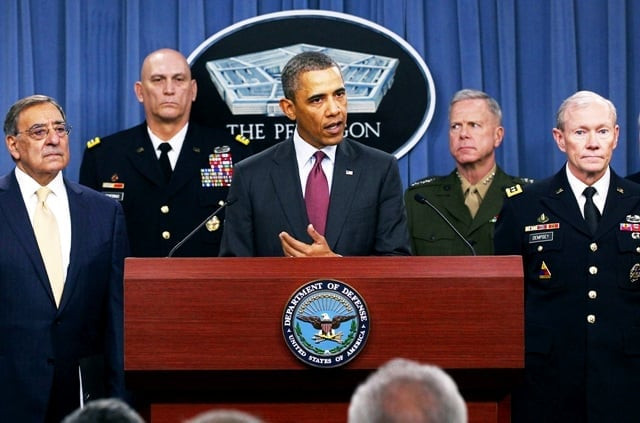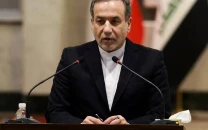Obama touts strategy for leaner US military
The plan calls for preparing for possible challenges from Iran and China with air and naval power.

The plan calls for preparing for possible challenges from Iran and China with air and naval power while downplaying any future massive counter-insurgency campaigns like those in Iraq and Afghanistan.
The "defence strategic review" sets out an approach for the US military in an era of austerity, as Obama's administration prepares for $487 billion in defense cuts over the next 10 years.
But Obama, anticipating attacks from his Republican rivals in an election year, said defence reductions would be limited and not come at the expense of America's military might.
"So yes, our military will be leaner, but the world must know -- the United States is going to maintain our military superiority with armed forces that are agile, flexible and ready for the full range of contingencies and threats," Obama told reporters at an unusual appearance at the Pentagon.
Obama deeply involved in strategy review: White House
White House officials stressed Obama was deeply involved in the strategy review and sought to portray the president as taking a responsible approach to defence spending informed by the advice of commanders.
Saying the country was "turning a page" on a decade of war, Obama said military strategy would increasingly focus on Asia, where commanders worry about China's growing military punch.
"We'll be strengthening our presence in the Asia Pacific, and budget reductions will not come at the expense of this critical region," he said.
Defence Secretary Leon Panetta, appearing with Obama along with top officers, said the strategy envisages a "smaller and leaner" force that will expand the military's role in Asia while maintaining a strong military presence in the Middle East.
Salient points of the strategy
According to the eight-page strategy document, the American military would work with allies in the Middle East to ensure security in the Gulf and counter Iran's "destabilizing policies."
However, counter-insurgency operations, like those in Iraq and Afghanistan, receive a lower priority under the new plan, enabling the administration to scale back the size of the US Army and the Marine Corps.
"US forces will no longer be sized to conduct large-scale, prolonged stability operations," according to the strategy document.
The review reinforces what defence officials have already signaled -- that funds will flow to aircraft and ships while the US Army and Marine Corps will be downsized after having expanded during a decade of protracted ground wars in Afghanistan and Iraq.
Washington's focus on Asia is fueled by concerns over China's growing navy and arsenal of anti-ship missiles that could jeopardize America's military power in the Pacific and access to the mineral-rich South China Sea.
The strategy review suggests reducing the nuclear arsenal without saying how, but some lawmakers have proposed reducing the number of nuclear-armed submarines.
The review also hints at reducing the military's footprint in Europe, without offering any details. "In keeping with this evolving strategic landscape, our posture in Europe must also evolve," it said.
The strategy discards the doctrine that the American military must be prepared to fight two wars at the same time, an idea long debated inside the Pentagon.
Instead, the US would be ready to fight one war while waging a holding operation elsewhere to stave off a second threat.
Before 2001, the Pentagon had prepared to fight two wars simultaneously but commanders faced a shortage of manpower in the conflicts in Afghanistan and Iraq.
The strategic review comes ahead of the proposed defence budget for 2013 due to be released in coming weeks, which is expected to call for delays in some weapons programs, including slowing the pace of production for the troubled F-35 fighter jet.
In discussing the next defence budget, Obama said that military spending will still remain high and "larger than roughly the next 10 countries combined."


















COMMENTS
Comments are moderated and generally will be posted if they are on-topic and not abusive.
For more information, please see our Comments FAQ